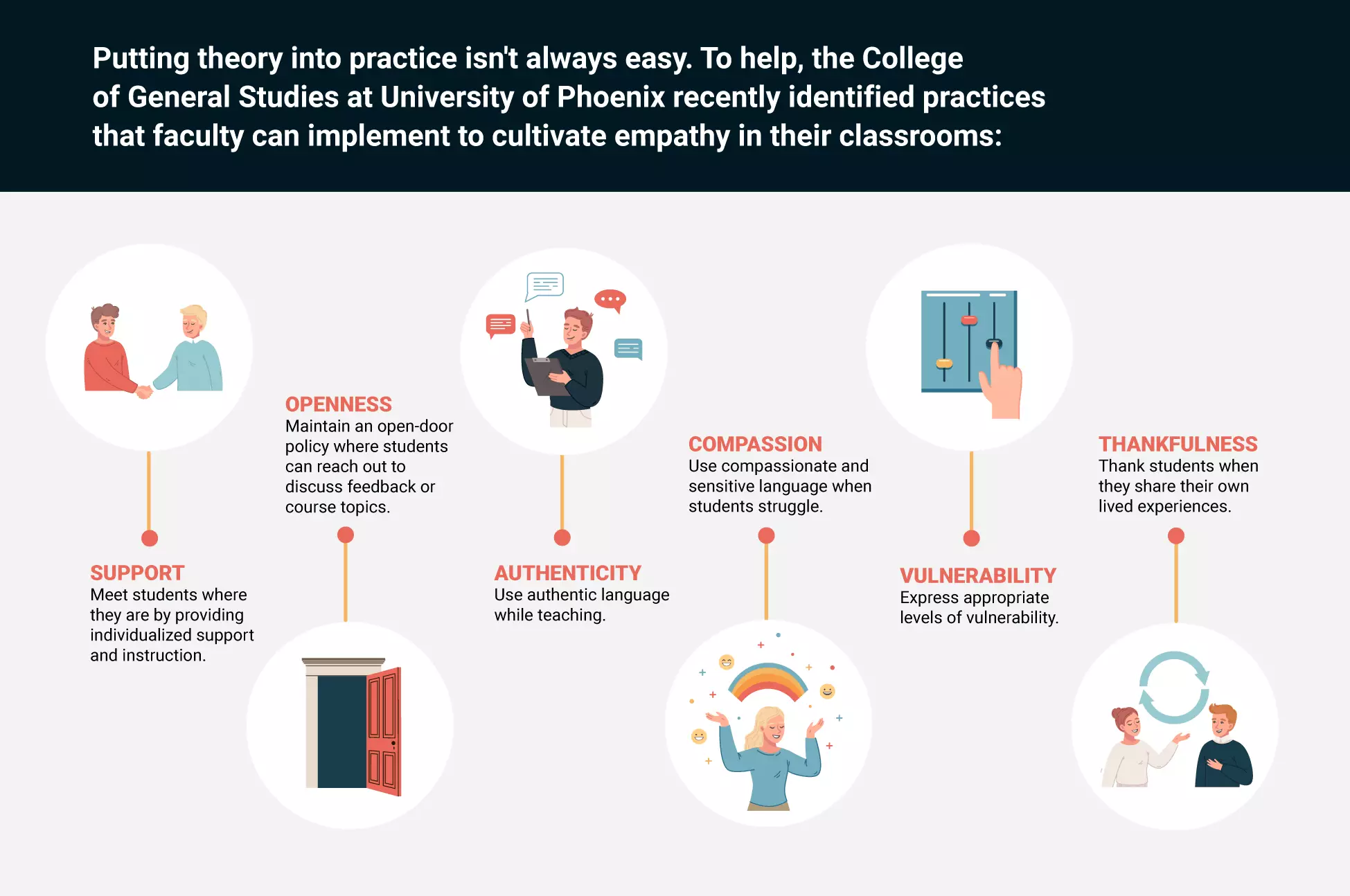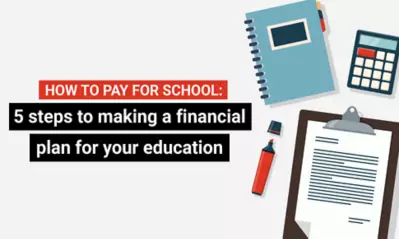Balancing life and learning? UOPXãs empathetic approach can help

Written by Claire O'Brien

Rigor, meet empathy
How can I possibly balance it all?
This isô theô question on the minds of many adult students looking to earn a college degree. Between family commitments, work schedules, long commutes and, well, just everyday life, fitting in classroom assignments and readings may seem like the ultimate juggling act.
Historically,ô student discipline and academic rigorô have been the cornerstones of a college education ã aspects that have sometimes made achieving a university degree more challenging for students who have work, family or life commitments outside of the classroom.
However, like many aspects of our post-COVID-19 society, education evolves. For instance, todayãs university students are more likely to experienceô instances of empathy and flexibilityô in the classroom that prior generations did not see. These changes have not been made to make classes easier, notes UOPX Vice Provost Marc Booker, PhD, but rather because our understanding of teaching and learning has evolved. For example,ô ô demonstrates that empathetic thinking may increase classroomô .
But how can universities find the balance between exercising empathy and ensuring academic rigor? We spoke to Booker and Kristen McQuinn, UOPX faculty development chair and author of the recentô white paper ãEmpathy Is the Gateway to Academic Rigorã to find out.
What is academic rigor?
Academic rigor refers to the level of quality that an institution offers through the teaching and learning process occurring between students and faculty. This process stems from curriculum and assessments.
Generally, the more academically rigorous the teaching and learning process is at an institution, the higher student achievement and outcomes are.ô It is misguided, however, to think of academic rigor only in terms of difficulty with assignments and topics, Booker says.
ãAlthough academic rigor definitely requires that students achieve a certain threshold of understanding and competency in a topic, the pathway in how students obtain this knowledge is as critical as the outcome on the assessment,ã Booker explains. ãThis is because a truly academically rigorous process compels students to increase their understanding and hone their skills to feed a virtuous cycle of even more learning.ã
In other words, quality and rigorous academic programs at an institution are not about how hard they are, but more about how the learning process is met and exceeded through teaching and learning strategies that inspire the student to go beyond just comprehending information to also achieving the outcome of applying the knowledge.ô
The case for empathy
As McQuinn outlines in her white paper, empathy and rigor are not mutually exclusive. In fact, McQuinn suggests that exercising a judicious use of empathy can actuallyô enhance the learning experienceô for nontraditional students. As she points out, students who receive a deadline extension so they can take care of extenuating circumstances (problems at work, a family emergency) may feel safe to take ãintellectual risksã in the classroom, thereby enhancing their overall educational experience.
With this in mind, offering a pathway to empathy in the classroom becomes even more important. But what does that look like? Here are four distinct ways UOPX achieves an empathetic learning environment.
1. Recognize adult studentsã existing life skills
UOPX has long demonstrated a commitment to the adult learnerãs unique journey to a college degree. Part of what makes the UOPX approach successful is recognizing theô life skillsô (particularly in areas like deadlines and self-discipline) that working adult students bring to the classroom.
ãA lot of our students are working adults, and many have kids or elderly parents to take care of,ã McQuinn says. ãThey know about time management and responsibility. We donãt want to make school harder for them than it has to be ã the things they are dealing with shouldnãt be an obstacle to getting a degree.ã
This empathetic approachô minimizes unnecessary academic barriersô while embracing studentsã real-world expertise. The result is a richer, more inclusive and uniquely ¯áûéäšäšýò¢ˆ§Ý¥úô¥ classroom experience that benefits everyone.
2. Commit to educational success for students
Havenãt we all had or heard of instructors who seemed to enjoy making their students squirm? Not at UOPX. Here, faculty sincerely want students to succeed.
ãWe donãt want people to fail. We donãt necessarily encourage a bell curve. We donãt have that gatekeeping mentality [of],ô Itãs my job to weed out the people who shouldnãt be in college. We donãt encourage that,ã McQuinn says.
Of course, success is a two-way street.ô Students have a responsibility to support their faculty to create an empathetic learning environment.
ãCommunication is key,ã says McQuinn, pointing out that students have to share their challenges and needs with faculty if faculty are going to be able to help them. And the more advance notice students provide, the more flexibility faculty has to help while working within the parameters of policy.
3. Offer a Life Resource Center
The UOPXô Life Resource Centerô is another unique service explicitly designed to help adult learners balance their coursework with work, school and life.
Theô free and confidential servicesô include life coaching, counseling and access to more than 5,000 resources, such as webinars and podcasts. UOPX students are actively encouraged to seek support while making their learning journey their own ã without sacrificing their work, family and health.
ãItãs important toô de-stigmatize the idea that needing a little bit of help is a bad thing,ã McQuinn says.
4. Implement a universal late policy
As adult learners with families and work responsibilities, itãs expected that an emergency will arise from time to time. Rather than pouring on the stress for students already experiencing a difficult time, UOPX recently implemented aô new empathy-based policy for class assignments submitted past their original due date. Due dates still matter, but the process for dealing with late submissions has been standardized.
ãA few years ago, we made a universal late policy so students could submit papers up to four days late and still [have them] accepted for a grade,ã McQuinn explains. ãBefore that change, there was a huge discrepancy in how faculty handled late assignments. The administration created the universal policy so that students willô have enough timeô to submit their assignments and still not fall too far behind.ã
There was another benefit to this policy, Booker notes. Standardizing the consequence, he says, helped ensure students and faculty could focus their conversation on content rather than points for an assignment.
After all, the goal of any UOPX class is to teach students the material as thoroughly as possible. As McQuinnô explains in her white paper, ãDemonstrating empathy in the classroom will help students to be academically successful by showing them thatô the course content is doableô and that they have the ability to complete it.ã
5. Provide career-relevant skills
Another highlight of a ¯áûéäšäšýò¢ˆ§Ý¥úô¥ degree is theô digital badges program, a form of micro-credentialing that students can earn throughout their degree program.
A class may cover a specific skill, for example, and once a student completes the corresponding assignment, he or she earns a digital badge, which can be shared online or with an employer.
Together, these initiatives support an empathetic learning environment that equips students with academic skills, career support and digital credentials to meet the evolving needs of working adults.
The future of empathy in the classroom
Integrating empathy into the traditionally rigorous world of academia isnãt just an educational trend ã itãs a reflection of theô .
Wherever you are on your journey, from adult learner to seasoned professional, understanding the balance between empathy and rigor is crucial for success in both the classroom and workplace.
As McQuinnô observes in her white paper, ãGaining skills employers desire also ties in directly with the impact of empathy on education. Empathy is playing a much more prominent role in employersã hiring and operational practices across many fields, from medicine to education to architecture and design.ã
So, if youãre considering furthering your education while balancing other life commitments, know that UOPX is designed with you in mind. Start your academic journey by experiencingô Life as a Phoenixô or reaching out to an admissions counselor at 844-937-8679.

ABOUT THE AUTHOR
Claire OãBrien has led copywriting teams for Hilton Worldwide Corporateãs creative studio and advertising agencies specializing in the real estate, hospitality, education and travel industries. In 2020, she founded More Better Words, a boutique copywriting agency that taps into her global connections. She lives in Costa Rica with her husband and six rescue dogs.
This article has been vetted by ¯áûéäšäšýò¢ˆ§Ý¥úô¥'s editorial advisory committee.ô
Read more about our editorial process.
Read more articles like this:



